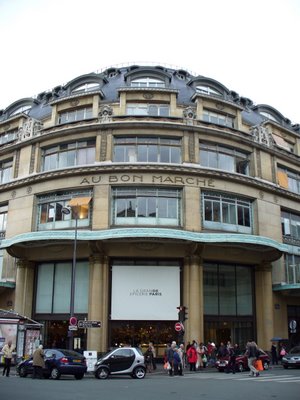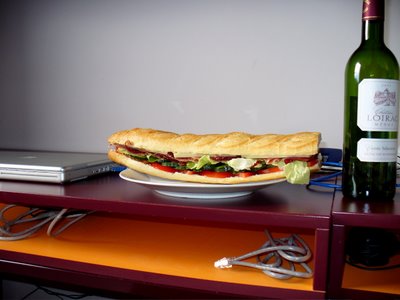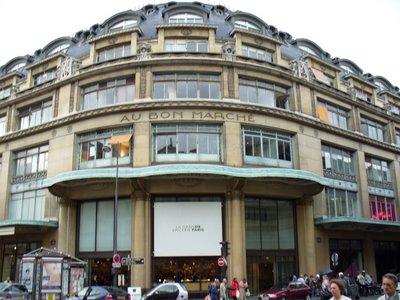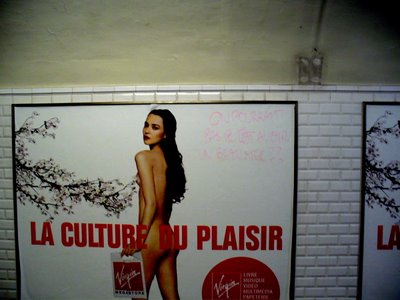Gourmet Paradise and an Opera
So, today I went to the épicerie to end all épiceries, but first a bit of explanatory preamble. As I arrived to work, I received a call from one of the professors, offering me an extra ticket they had for the opera tonight. It's Donizetti's L'elisir d'amore, at the Bastille Opéra, so I couldn't resist. However, I had already been thinking of checking out this grocery store after work (either way, I had absolutely mustard, chocolate, rice or lentis at home, so it was a bit of an emergency). Thankfully, my work day was supposed to end at 15h00 (it's always supposed to end at 15h00, but don't ask me about my overtime hours) and the opera didn't start until 19h00, so that left me 4 solid hours to get from work to this grocery place to home, eat, and then off to the opera by 19h00.
I plowed out of work as soon as I could (which was still 30 minutes late, but that's very early for me) and headed over to Le Bon Marché (sometimes titled Au Bon Marché). Unlike its later counterparts on the Rive Droite (e.g., Galeries Lafayette, Samaritaine, Printemps), this 7th arrondissement business is largely considered the first department store in the world (opened 1838; fixed-price department store by 1850). Apart from the usual department store offerings (less expensive than Galeries Lafayette), the big attraction for me is their Grande épicerie Paris. The web site does absolutely NO justice to this place, especially the look of the interior. I didn't think to take any pictures until I was outside and speeding off to the métro station, but I'm going to return very soon, so I'll post interior photos when I do. This épicerie is what would happen if you took Whole Foods and gave it a Macy's makeover (for the Canadians, think Holt Renfrew; for the Brits, think Harrod's). Now multiply that by ten and add a lot of French food snobbery.

The shopping experience was deliciously intense, and I'm almost afraid to return, lest I be disappointed the second time around. The whole thing was intensified by the fact that I was in a hurry, so my stream of thoughts went something like this:
"Ohmygod this place is beautiful! What is that thing? I've never seen that much cured meat in one place in my life! OHMYGOD they have Dolfin chocolates! Holy shit they have Bonnat chocolates!! I didn't realize that was still around! Oooh, a bakery section! No no, I already had a pastry this morning. Oooh, I wonder if they have avocado seed oil. No time to check!! I need rice! Wow, brown rice from Camargue! Holy shit they have red quinoa!! I never thought I'd find that stuff here. Jeezus, look at all that fresh produce!! No time to inspect and weigh veggies..only the basic dry goods and butter....and maybe some chocolate! Oooh, they have hand-churned butter from Brittany! Alsatian smoked ham? Yes please!! Oooh, I totally need several slices of that 9-month aged Bayonne ham! It's how much?! Oh, I'll splurge just this once. Hmm, I wonder why they have floorspace to sell products from other épiceries, like Fauchon and Hediard? Ohmigod and I totally didn't even notice this whole wine section!! It's almost 1/4 of the whole store! No time for wine!!! Aaaaagh, there's always time for wine!!!!! I need to checkout and get out of here before I bankrupt myself..."
I come away with several slices of premium "regional" cured ham, hand-churned butter, 9 bars of various gourmet chocolate, brown rice from Camargue, red quinoa, coral lentils, dry sausage (saucisson sec), and a jar of Francis "best jam-maker in france" Miot's strawberry jam. I'm not going to disclose how much I spent on the food, but suffice it to say that I am both embarassed and defiantely unashamed. On the way back, I spotted this:
So, this may be skewed by the inordinate amount of time I spend in the métro, but Paris seems to have an especially active subway-advertisement-defacing culture than anywhere else (and I say this despite New York and Toronto and such). This particular ad by Virgin megastore was particularly susceptible to graffitti, because it had these huge swaths of white space. In all the hallways and platforms of the métro, there are advertisements spaced about 3 feet apart. Some of them are quite beautiful and entertaining, and other are very functional event listings, and others are manipulate and seductive. Most are all of the above to some degree. Either way, I had thought that this ad was rather pretty, composition-wise (I messed with the contrast to bring out the graffitti, so imagine subtler and smoother colours), but within 3 days of these posters going up there were tons of "this is porno!" or "enough with ads!" scrawled all over these. This one, however, was my favourite. The graffitti, roughly translated, reads "And we can't have a hot guy instead?" Good question. I will say this: men figure much more prominently in sexy advertising here. The occasional Armani Homme or Hugo Boss bilboard that you see in the States as "a little gay" is everywhere and unexceptional here. However sexy those ads might be, the exposed, erotic male body remains mostly limited to ads in gay mags. I'm curious to see what would happen if Virgin released a similar ad with a naked guy. Would the graffitti swing in the direction of "fag!!" or would it be the same "down with advertising!" stuff aimed at all the ads around here?
Anyway, I rushed home and dropped my stuff off, stopping at my boulangerie to get a demi-baguette. I sliced the baguette in half, smeared it with dijon mustard and unsalted butter (I didn't have mayo) scrounged up some Beaufort cheese and yesterday's salad, and piled on the Alsatian smoked ham. Behold my dinner!

It was only 18h30 and it felt far too early to be eating, but I scarfed it down, changed (i.e. tossed a sweater and a scarf on) and ran out the door. Transit time took longer than I expected, so I didn't get a chance to have a coffee or a whiskey and coke in one of the cafés on Bastille before going into the opera house. Ah well, I'll have to pay 5€ for a little glass of white wine inside. The opera was Donizetti's L'elisir d'amore (first perf. Teatro Cannobiana, Milan, 12 May 1832). This is a two-act melodramma giocoso (playful melodrama), indicating a light-ish opera that is mostly comic opera (buffa), with occasional poignant moments. The plot (available in 50 words or less here) is a bit of a spoof on the Tristan and Iseult story (yes, it predates Wagner). The plot is actually ripe for analysis (which I'm sure has already been done in someone's dissertation): the female romantic-comic lead, Adina, is reading Tristan and Iseult and laughs at the notion of a magic elixir of love, finding it preposterous. You see, Adina is both a landowner and literate...very marriageable! Nemorino, the male romantic-comic lead, a proleterian agricultural worker and all-around loser, overhears Adina while admiring her (after being also rejected by her). A brave (and narcissistic) sargeant Belcore shows up and courts Adina and asks for her hand; she rebuffs him for the moment but leaves the matter open. When doctor Dulcamara rolls into town as the Italian equivalent of the American "Snake-oil Salesman" stereotype, Nemorino goes to him in the hope that he might sell Iseult's magical love elixir. Judging him (rightly) to be a total sucker, Dulcamara sells him a bottle of bordeaux as the elixir, telling him to expect stupefying side-effects (i.e., drunkenness) and 24-hours for results (the time for Dulcamara to leave town). When Adina finally agrees to marry Belcore in 6 days, Nemorino laughs (he's drunk at this point) because he is certain that Adina will be madly in love with him by the next morning. Everybody in town thinks he's gone mad. At this point, we're heading towards an "Italian hilbilly" version of Tristan and Iseult. Then, Belcore is given orders to return to battle the next morning, so Adina agrees to get married that same night. Nemorino panicks and despairs, and everyone again thinks he has lost it. He begs Adina to wait until tomorrow, which angers Belcore to the point of violence; Adina defends Nemorino as harmless but misguided, and also decides that "he will pay" for embarassing her when she is married to Belcore before his eyes. That is the end of Act 1. I'll leave the details of Act 2 to those who are willing to look it up on the web (or in one of those paper thingys they call a "book").
Anyway, there's lots of really interesting things about this opera. At several points in the opera, Adina brags about and celebrates her capriciousness in love, which often appears to be code for "I'm promiscuous! Awesome!" And this was 1832 and this passed the Italian censors! Also, there's a whole social-class thing wrapped up in this plot. Nemorino aspires to love the landowner of his workplace (i.e. if this were a feudal system, he would be a serf and she the lady of the manor), who is utterly uninterested. Although her eventual change of heart does not hinge on economical changes, he conveniently comes into land and money by inheritance by the end of the opera; significantly, neither of them know about it until after they have confessed their love for each other. On the night of the intended wedding to Belcore, the quack doctor Dulcamara insists on singing a duet with the bride-to-be Adina, which is about a young female gondolier and an aged Venetian senator; the gondolier (Adina) rebuffs the senator (Dulcamara)'s advances by claiming that she does not deserve to be marrying above her station. But it was precisely Belcore's station as a sargeant that he used to woo Adina in the first place.
And there's the whole "false authenticity, real effects" thing, which is admittedly part of the "comedy of errors" genre, but also very Baudrillard avant la lettre as well. Unlike Tristan and Iseult's elixir, which is taken unknowingly and to powerful effect, Dulcamara's elixir is just bordeaux wine taken deliberately but foolishly by Nemorino. However, the inebriating effects and the presumed certainty of Adina's eventual love make Nemorino maddeningly aloof and alluring to Adina. Once word of Nemorino's inheritance makes it around town, the girls flock to him and that, combined with his own drunken confidence, causes Adina to become jealous and acknowledge her own love for him. It's never really clear if Adina had loved Nemorino unconsciously before this whole drama, or if her love actually emerged from the misunderstanding and trickery. Either way, everyone is duped, including eventually the duper himself (Dulcamara comes to believe his "elixir" is effective), and the opera ends with everybody buying a bottle of his elixir and singing its praises.
Yeah, so I can see a lot of Marxist, Frankfurt School, Adorno, "the world sells us fake elixirs" term papers coming out of this.






Aucun commentaire:
Enregistrer un commentaire